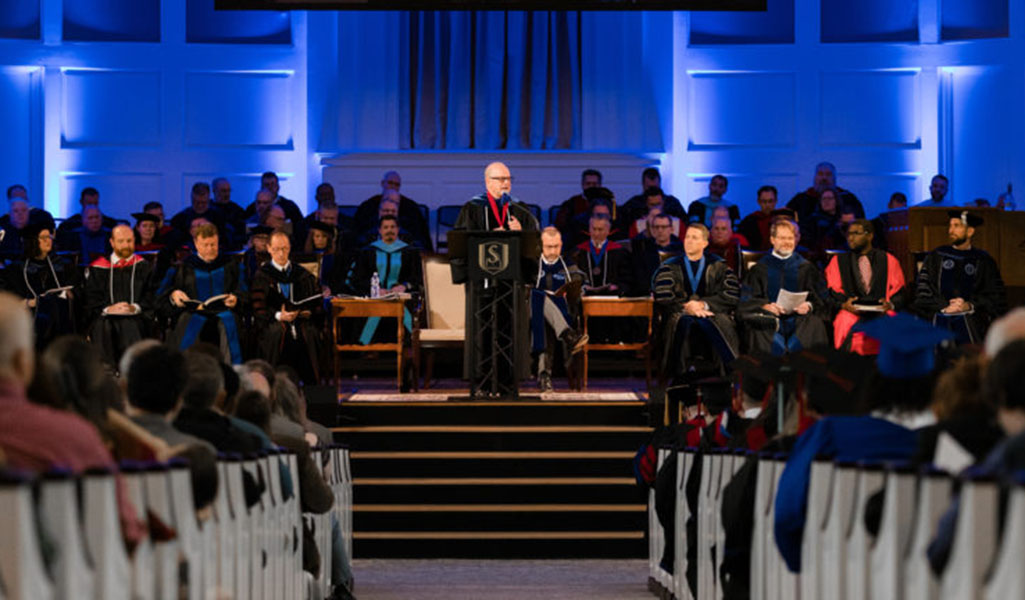
SEBTS President Danny Akin addresses graduates in December.
WAKE FOREST, N.C. – In 1980, two years after Charlotte and I got married, I started my MDiv program at one of our sister seminaries. I remember our excitement in those days. Even though we were poor (like most seminary students) and did not know how the Lord intended to use us for His mission, we were passionate to serve Him. That is why I chose the MDiv program.
My own experience in the MDiv program was life changing. It was worth the 80-mile round trip I made several times a week for three and a half years. The breadth and depth of my studies prepared me for service in areas of the church that I did not even know existed. By studying the biblical languages, theology, personal evangelism, preaching and many other subjects in seminary, I was better equipped for the ministry God had in store for me. I can never repay the impact men like Russ Bush, Roy Fish, Tom Nettles and Curtis Vaughn had on my life. In so many ways, I wish I had been able to take even more classes and study longer with these men in the MDiv program.
In my mind, the MDiv is the bare minimum necessary for a life of service in the body of Christ. Here are three reasons why I believe every student with a heart for ministry should consider the MDiv program.
Why the MDiv Matters for Ministry
1. Biblical and theological training is the bedrock for faithful ministry
After 45 years in ministry, I still believe that the gold standard of seminary education is the MDiv. The MDiv is designed to provide the bedrock basics for faithful ministry in the local church and for missions around the world. The MDiv will take you deeper in biblical and theological training and equip you to teach and obey the truth of God’s Word – regardless of the challenges and complexities of ministry. As an MDiv graduate from one of our six Southern Baptist seminaries, I know firsthand the significance of the training that the MDiv program offers. The MDiv was a formative time for me as I learned the theological habits of mind that have rooted me deeply in God’s Word and in the life of the church.
That is why I am delighted that all four of my sons, who are now in ministry, chose to pursue an MDiv. Their MDiv training deeply formed them biblically and theologically, and they are still using today what they learned so many years ago in seminary to serve the church and lead their families and churches to love God and obey His Great Commission. We must be equipped to articulate, defend and practice the historic doctrines of the church and lead and counsel others to do the same. Because that is exactly what the MDiv equips students to do, I believe everyone who desires to do ministry would be well-served by the MDiv.
2. Practical ministry preparation is invaluable for future leaders
Although all our graduate degrees offer a wonderful biblical and theological education, the MDiv allows for unique hands-on, practical training with its mission practicum or church-based internship component. I am convinced that the best theological education takes place in a partnership between the seminary and the local church. There are some things you can only learn in the refining fires of a local church or the mission field because there you are dealing with real people in real-life settings. The MDiv is designed for practitioners with a heart for ministry in the local church – both here in the U.S. and around the world.
Even though ministry leaders have always needed biblically rooted wisdom to lead and counsel others through cultural challenges, our seminary graduates today are entering a particularly volatile time with communities deeply divided over race, gender, politics and a myriad of other issues. I am convinced that one of the best ways we can prepare our MDiv students for ministry is by pairing their biblical and theological training with practicums and internships in the field. There in the field, MDiv students will learn to speak with truth and grace about what they have learned in the classroom. There they will learn to have compassion on those who oppose and slander them. There they will learn to grieve with families beside hospital beds, to preach and teach with a prayerful heart for a particular congregation, and to wrestle with how to evangelize cross-culturally in biblically faithful ways. As I consider the kind of training that our students need to face the challenges of our time, I recommend the MDiv without hesitation.
3. More training is better than less training
One of the benefits of the MDiv is that it entails a longer season of ministry preparation than that of other graduate degrees. Because the MDiv allows more time for formation and more sustained interaction with professors, I was able to grow deeply and build lasting relationships with my professors, who modeled biblical fidelity and encouraged me to do likewise. Unfortunately, many students see a longer season of ministry preparation as less desirable. However, I believe that you ought to go as far in ministry preparation as your ability and availability allow. Does that mean everyone should do an MDiv? No, but everyone that has the ability and availability to do an MDiv should do one.
When reflecting on the incredible ministry that God gave him, Billy Graham said, “One of my great regrets is that I have not studied enough. I wish I had studied more and preached less.” It is a weighty responsibility to teach and lead others with gospel clarity, biblical fidelity and doctrinal precision. My concern is that many who accept or pursue positions of leadership may not be ready to do so because they have not been biblically, theologically and ministerially trained. Though God uses many who have never been trained at seminary, I believe wisdom would counsel that if such training is available to you, you should strongly consider a rigorous season of ministry preparation — such as the MDiv uniquely affords.
The MDiv from a Great Commission Perspective
What I think makes Southeastern’s MDiv program stand out is that we approach the MDiv under the umbrella of the Great Commission. I believe that we teach biblical, theological and ministerial classes best because we do so with an intentional effort to equip our students to fulfill the Great Commission in all of life. We believe that if every classroom is going to be a Great Commission classroom and every professor is going to be a Great Commission professor, then we must be intentional to make that happen in every aspect of our students’ training.
The Great Commission is King Jesus’s final marching orders for the church, and because we are servants of the church, we design our MDiv program to help students grow in obedience and commitment to the Great Commission. The MDiv at Southeastern is not an end in itself; it is a means to fulfilling the Great Commission.
So, if you have a heart for the local church; if God has given you the ability and availability, if you recognize the importance of rigorous training for ministry, and if you desire to have the Great Commission shape every aspect of your training, I invite you to consider the MDiv at Southeastern. It would be our delight to join you in your ministry training and equip you to serve the church and fulfill the Great Commission of our King.
For more information about Southeastern’s MDiv specializations, visit the MDiv program page on our website, or sign up for an upcoming seminary preview day to learn how Southeastern can equip you for ministry wherever God sends you.
(EDITOR’S NOTE – Danny Akin is the president of Southeastern Baptist Theological Seminary and the College at Southeastern in Wake Forest, North Carolina.)


